People
Shays' Rebellion affected many people. This website shares the stories of some of the men and women who lived through this event and its aftermath. Click a person's image or name to view his or her story. For an explanation of how we created these narratives, see: Bringing History to Life: The People of Shays' Rebellion.
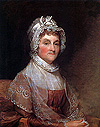
- Abigail Adams
- 1744-1818
- Abigail Adams was in England, far from her Massachusetts home, when news of Shays' Rebellion reached her.
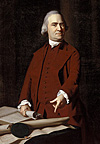
- Samuel Adams
- 1722-1803
- Samuel Adams believed that "the man who dares rebel against the laws of a republic ought to suffer death."
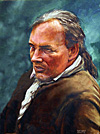
- Elihu Ashley
- 1750-1817
- Dr. Elihu Ashley was a successful physician from Deerfield. The tumultuous popular protest of the 1770s taught him to view such activities and the people who joined them as a dangerous threat to law and order.
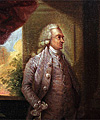
- James Bowdoin
- 1726-1790
- Governor James Bowdoin was determined to do everything in his power to protect the laws and government of the Commonwealth of Massachusetts from lawless insurgents.
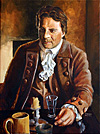
- Seth Catlin
- 1734-1798
- Persecuted and jailed as a suspected loyalist during the Revolution, Seth Catlin administered Massachusetts' oaths of allegiance to former insurgents in 1787.
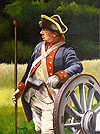
- John Chaloner
- 1758-1793
- John Chaloner's actions against the mob attempting to take over the United States Arsenal at Springfield resulted in tragic personal consequences.
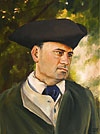
- Luke Day
- 1743-1801
- Outraged by the Legislature's refusal to respond to the grievances of the people, Captain Luke Day made the fateful decision to lead the Regulators in arms against the government.
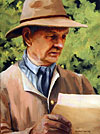
- Thomas Foster
- 1734-?
- Private Thomas Foster recorded the excitement soldiers of the Continental Army felt at the coming of peace in 1783, as well as the bitterness they felt at their poor treatment at the hands of Congress.
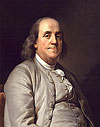
- Benjamin Franklin
- 1706-1790
- Benjamin Franklin personally congratulated Governor Bowdoin on successfully protecting the government of Massachusetts from the "mad attempts to overthrow it."
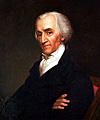
- Elbridge Gerry
- 1744-1814
- Elbridge Gerry of Massachusetts signed the Declaration of Independence, but he refused to sign the proposed Federal Constitution; he believed the lack of a Bill of Rights was a fatal flaw.
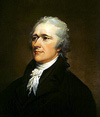
- Alexander Hamilton
- 1757-1804
- Alexander Hamilton played a key role at the Philadelphia Convention and in the subsequent efforts to get all the states to ratify the proposed United States Constitution.
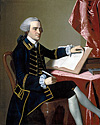
- John Hancock
- 1737-1793
- Following his landslide victory in 1787, Governor John Hancock reversed the preceding administration's hard-line policies toward the rebels.

- Mary Harvey
- 1746-1785
- Mary Harvey was expecting her eleventh child as the American Revolution at last came to a close.
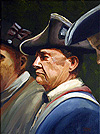
- Moses Harvey
- 1723-1795
- Moses Harvey's outspoken support for the Regulators cost him his seat in the Massachusetts House of Representatives.
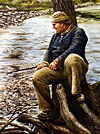
- Justin Hitchcock
- 1752-1822
- A strong supporter of government, Justin Hitchcock marched to Springfield in 1786 to protect the Massachusetts Supreme Judicial Court from the insurgents.
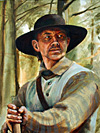
- David Hoyt, Jr.
- 1757 - 1803
- David Hoyt, Jr., was one of 1,300 local men who defended the United States Arsenal in January 1787. He wrote one of the sole surviving first-hand accounts of the bloody confrontation between the government militia and the Regulators.
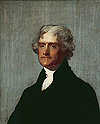
- Thomas Jefferson
- 1743-1826
- Thomas Jefferson was the principal author of the Declaration of Independence. He was the United States minister to France during Shays' Rebellion and wrote expressing his belief that "a little rebellion now and then is a good thing."

- Jonathan Judd
- Jonathan Judd of Southampton traveled to Springfield to protect the Supreme Judicial Court from "the mob."
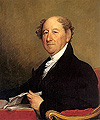
- Rufus King
- 1755-1827
- Rufus King was a Massachusetts lawyer who served in the Continental Congress. He was a delegate to the Philadelphia Convention, where he helped prepare the final draft of the proposed United States Constitution.
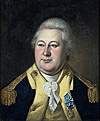
- Henry Knox
- 1755-1806
- Major General Henry Knox served as General George Washington's Chief of Artillery in the Revolution and was his close personal friend. He was Secretary of War first under the Articles of Confederation, and later as a member of Washington's cabinet.
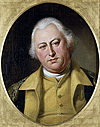
- Benjamin Lincoln
- 1733-1810
- During the Revolution, Major General Benjamin Lincoln earned the confidence and esteem of General George Washington. Lincoln commanded the government militia during Shays' Rebellion and attended the Massachusetts constitutional ratifying convention.
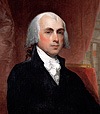
- James Madison
- 1751-1836
- For James Madison, the unrest in Massachusetts was further evidence of the "Vices of the Political System of the United States."
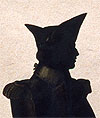
- Hugh Maxwell
- 1733-1799
- Lieutenant Colonel Hugh Maxwell of Charlemont was a unwavering Friend of Government during the rebellion.
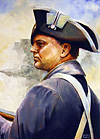
- Hugh McClellan
- 1743-1816
- Unlike most of his neighbors, Hugh McClellan supported the government during the insurrection. His defense of the United States Arsenal so angered the other Colrain residents that for a time his life was in danger.
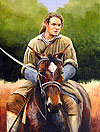
- Henry McCulloch
- 1751-1819
- Henry McCulloch of Pelham was sentenced to death for his part in the Regulation.

- Jason Parmenter
- 1734-181?
- Jason Parmenter's flight from Massachusetts one step ahead of the government militia ended in tragedy.

- Elizabeth Porter Phelps
- 1747-1817
- Elizabeth Porter Phelps feared that nothing less than a miracle would prevent blood from being shed at Springfield.
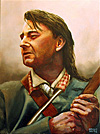
- Caleb Phillips
- 1755-1829
- Caleb Phillips of Ashfield joined the Regulators to defend the rights for which he fought in the War for American Independence.
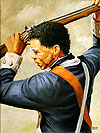
- Moses Sash
- 1755-?
- An African American veteran of the Continental Army, Moses Sash was indicted by a Massachusetts court in 1787 and identified as a "Captain & one of Shaises Council."
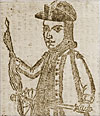
- Job Shattuck
- Severely wounded in a standoff with government troops sent to capture him, Job Shattuck of Groton would languish for months in a Boston jail .
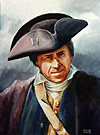
- Daniel Shays
- 1747-1825
- Captain Daniel Shays became identified as the leader of a movement some would call a rebellion.
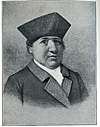
- William Shepard
- 1737-1817
- Major General William Shepard paid a heavy price for his determination to uphold law and order in Massachusetts against the insurgents.
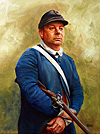
- Joseph Stebbins
- 1749-1816
- A firm friend to the cause of liberty, Colonel Joseph Stebbins had little use for men who took up arms against the republic of Massachusetts.
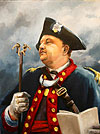
- William Stevens
- Major Stevens had earned a well-deserved reputation as one of the Continental Army's most talented and experienced artillery officers. In January, 1787, he called on that expertise to fire on fellow Colrain residents.
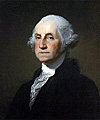
- George Washington
- 1732-1799
- George Washington feared that Massachusetts was teetering on the edge of anarchy.
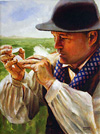
- Agrippa Wells
- 1738-1809
- Once Captain Agrippa "Grip" Wells decided to join the Regulators, he did not look back.
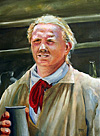
- Reuben Wells
- 1753-1815
- Former Regulators flocked to Reuben Wells' tavern in Greenfield to take the oath of allegiance that would keep them out of prison and off the gallows.
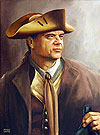
- John Williams
- 1751-1816
- The Revolution was not easy for John Williams. He hoped his business would survive the severe post-war recession.